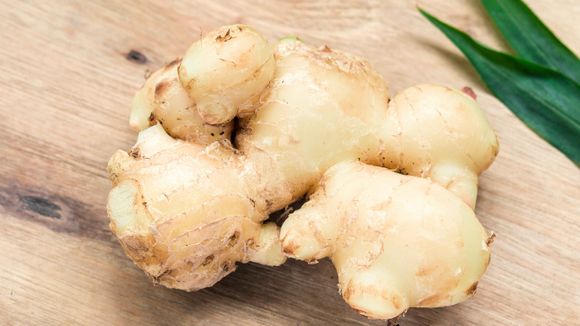1. Abdominal Pain and Cramping - Ajwain (Trachyspermum ammi)
Ajwain, a traditional Indian spice, possesses carminative properties that can ease gas, reduce bloating, and provide relief from spasms. A cup of ajwain tea, made by simmering a teaspoon of ajwain seeds in water for 10 minutes, can be your go-to remedy for abdominal pain.
2. Bloating and Gas - Asafoetida (Ferula assa-foetida)
Asafoetida, commonly known as "hing," is a resinous spice renowned for aiding digestion, reducing flatulence, and easing abdominal discomfort. Including a pinch of asafoetida in your meals or dissolving it in warm water can provide quick relief from bloating and gas.

Photo by Brooke Lark on Unsplash
3. Diarrhea and Constipation - Psyllium Husk (Plantago ovata)
Psyllium husk, a natural source of soluble fiber, helps regulate bowel movements by alleviating constipation and absorbing excess water during diarrhea. Consuming a teaspoon of psyllium husk mixed in water before bedtime can promote regularity.
4. Herbal Tea for Relaxation - Chamomile (Matricaria chamomilla)
Chamomile tea, derived from dried chamomile flowers, possesses anti-inflammatory and antispasmodic properties that can relax the digestive tract and ease stress-related symptoms.
5. Nausea and Vomiting - Peppermint (Mentha piperita)
Peppermint oil, with its menthol content, offers relief from nausea and promotes healthy digestion. A few drops of peppermint oil diluted in a carrier oil can be gently massaged onto the abdomen for soothing comfort.

Photo by sentot setyasiswanto on Unsplash
6. Ginger for Digestive Comfort - Ginger (Zingiber officinale)
Ginger's potent anti-inflammatory and digestive benefits make it a valuable ally against IBS symptoms. Prepare ginger tea by simmering fresh ginger slices in water for 10-15 minutes.
7. Curcumin's Anti-Inflammatory Power - Turmeric (Curcuma longa)
Turmeric contains curcumin, an anti-inflammatory compound that can assist in managing IBS symptoms. Integrating turmeric into your cooking or consulting a healthcare provider for turmeric supplements can offer relief.
Anticancer Properties
Among these remedies, curcumin from turmeric and the anti-cancer potential of peppermint oil have garnered significant scientific attention. Curcumin's ability to inhibit cell proliferation and induce apoptosis in cancer cells aligns with peppermint oil's demonstrated cytotoxic effects against various cancer cell lines.

Photo by Towfiqu barbhuiya on Unsplash
Questions and Answers
Q: What dietary guidelines should I follow to alleviate IBS symptoms?
A: Embrace a low-FODMAP diet, focusing on reducing fermentable carbohydrates that trigger symptoms.
Q: Can mindfulness practices like yoga aid in managing IBS?
A: Absolutely! Yoga and meditation can reduce stress, a common IBS trigger, enhancing overall well-being.
Q: Are there Indian herbs to address IBS-related anxiety?
A: Ashwagandha (Withania somnifera) is an adaptogenic herb that could potentially alleviate IBS-related anxiety.
Q: Are these remedies safe for pregnant individuals?
A: Consult a healthcare provider, especially during pregnancy, to ensure safe incorporation of remedies.
Q: When can I expect noticeable results from these remedies?
A: Results vary, with some experiencing relief within days and others in a few weeks. Patience is key.
References
Chainani-Wu N. (2003). Safety and anti-inflammatory activity of curcumin: a component of turmeric (Curcuma longa). The Journal of Alternative and Complementary Medicine, 9(1), 161-168.
El-Seedi, H. R., & El-Said, A. M. (2017). Peppermint oil enhances cisplatin activity in resistant ovarian cancer cells. Journal of Pharmacy & Pharmaceutical Sciences, 20, 65-72.









